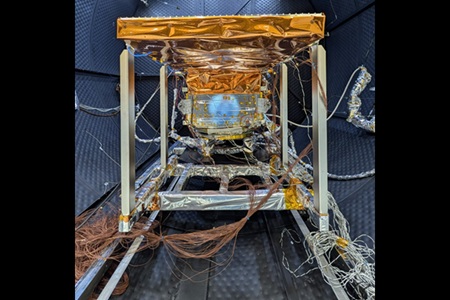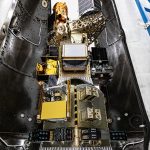Etihad-SAT was built through a partnership between the Mohammed bin Rashid Space Centre and South Koreas Satrec Initiative.
 The Mohammed Bin Rashid Space Centre (MBRSC) has announced details of the launch of its first Synthetic Aperture Radar (SAR) satellite, Etihad-SAT. The satellite developed in partnership with South Koreas Satrec Initiative is scheduled for launch in the first week of March 2025 aboard SpaceXs Falcon 9 rocket from the Vandenberg Air Force Base in California, USA.
The Mohammed Bin Rashid Space Centre (MBRSC) has announced details of the launch of its first Synthetic Aperture Radar (SAR) satellite, Etihad-SAT. The satellite developed in partnership with South Koreas Satrec Initiative is scheduled for launch in the first week of March 2025 aboard SpaceXs Falcon 9 rocket from the Vandenberg Air Force Base in California, USA.
Etihad-SAT represents a significant milestone in MBRSCs Satellite Development Programme, as it is the first satellite equipped with SAR imaging technology. The advanced capability will enhance the Centre’s Earth observation capabilities by providing high-resolution images in all weather conditions, while further advancing the UAE’s expertise in satellite technology.
H.E. Hamad Obaid AlMansoori, Chairman, MBRSC, said: “The launch of Etihad-SAT reflects the UAEs commitment to strengthening its capabilities in the space sector by adopting the latest advancements in satellite development. Adding a SAR satellite to our fleet expands our ability to provide solutions that support our journey toward a knowledge and innovation-based economy. We will continue our mission to develop ambitious space projects that enhance our ability to tackle global challenges, provide innovative solutions that support environmental sustainability, and drive technological progress.”
H.E. Salem Humaid AlMarri, Director General, MBRSC, added: “Etihad-SAT is the result of our collaboration with Satrec Initiative as part of a knowledge-transfer programme, marking a new milestone that enables us to gain expertise in SAR satellite development. With its advanced capabilities, the satellite will support many vital sectors in the UAE. This mission is a testament to our commitment to developing innovative space solutions that contribute to sustainable development, strengthen the national economy, and enhance the UAEs standing in the global space industry.”
The development of Etihad-SAT began two years ago as part of a knowledge transfer programme in collaboration with South Koreas Satrec Initiative. The MBRSC team initially focused on defining the satellites specifications and requirements before moving to the preliminary design and technical testing phase to ensure compliance with the highest industry standards.
In the next phase, MBRSC engineers led the final design and manufacturing processes in partnership with experts from Satrec Initiative, reinforcing the UAEs commitment to global collaboration in space technology.
The satellite is equipped with advanced SAR technology that enables high-precision Earth observation across all weather and environmental conditions during both day and night. The satellite offers three imaging modes: spot mode (high-resolution imaging for small areas), scan mode (wide-area coverage for large regions) and strip mode (extended observation for longer regions).
These features make Etihad-SAT a powerful tool for multiple industries, from detecting oil spills and managing natural disasters to enhancing maritime navigation, supporting smart agriculture, and conducting environmental monitoring.
SAR technology is one of the most advanced Earth observation techniques, allowing satellites to capture high-resolution images of the Earth’s surface regardless of weather conditions, time of day, or atmospheric interference. Unlike traditional optical cameras, radar imaging relies on radio waves that penetrate clouds, darkness, and even rain, making it a powerful tool for consistent and uninterrupted data collection.
The technology functions by transmitting radar signals from the satellite toward Earth. These signals bounce back from surfaces and return to the satellite, where the system records key data such as signal return time and strength. By analysing the data, highly detailed images of the Earth’s surface can be generated.
Once deployed, Etihad-SAT will join the UAEs current fleet of satellites, significantly enhancing MBRSCs remote sensing capabilities. MBRSC will oversee the satellites operations, ensuring rapid data exchange and processing with the support of artificial intelligence.











































































